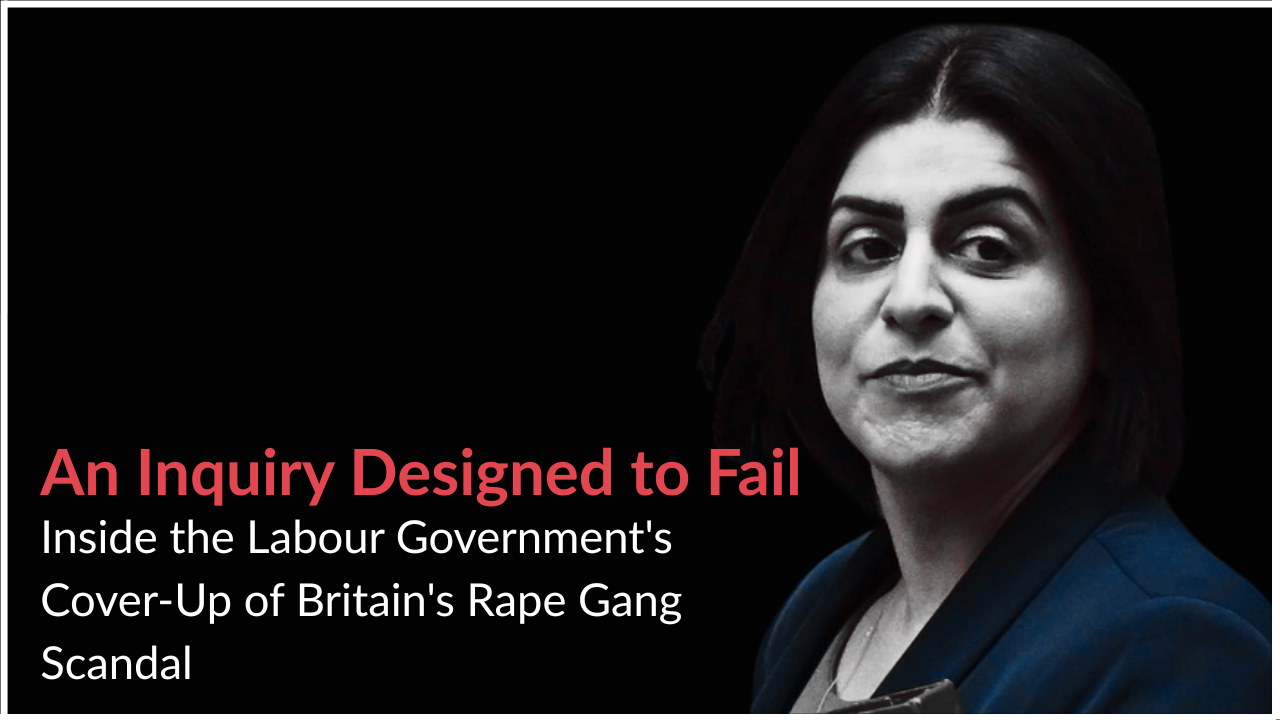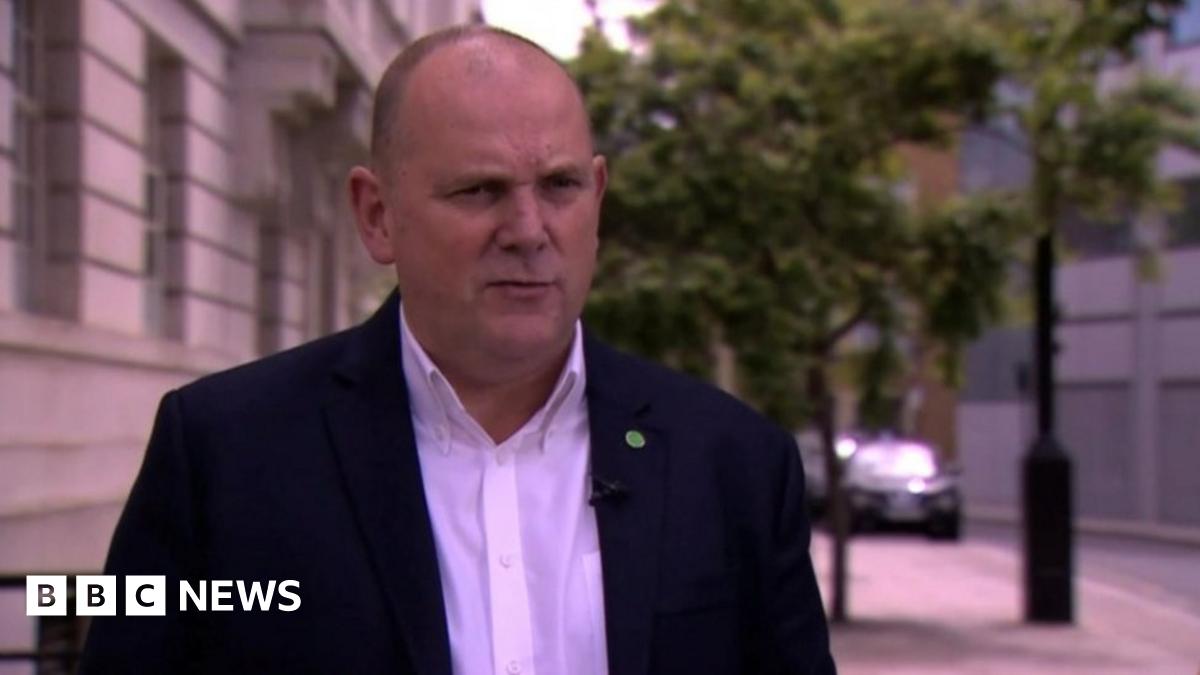An Inquiry Designed to Fail

How to Sabotage a National Investigation in Ten Steps and Why the Grooming Gangs Inquiry May Already be Doomed
Jim Gamble is on a two person shortlist to chair the new national inquiry into grooming gangs. A former senior police officer, veteran child safeguarding figure. Public records from 2015 show his ties to the Labour Party. More than just a member at the time, he was an activist who spoke at the party's annual conference in Brighton, backed Yvette Cooper for leader, and campaigned for Labour to field candidates in Northern Ireland.

Alongside him, Annie Hudson. Former director of children's services in both Lambeth and Bristol, later chief executive of the College of Social Work, and now the government's own chair of the Child Safeguarding Practice Review Panel. This is the body set up by the Department for Education to review the country's most serious child protection failures. It does not investigate in real time or hold anyone to account. It reviews what went wrong after the fact and issues recommendations to the same agencies that failed in the first place.
In 2012, as the first wave of grooming gang prosecutions was exposing catastrophic social work failures, Hudson was named Social Worker of the Year for her "outstanding contribution to social work." The Independent Inquiry into Child Sexual Abuse later found that children in Lambeth's care had been sexually abused, and the council "accepted that children in its care were sexually abused and that it failed them."
A Guardian investigation reported survivors secured over £46 million in compensation for what it called "horrific" abuse in Lambeth's children's homes spanning decades.

Her appointment would be politically convenient. The person who already represents the system's self-assessment process may soon be asked to lead its national reckoning.
This is how an inquiry dies before it begins. When those who should be investigated choose who will investigate them, the outcome is not just predetermined. It is professionally choreographed.
What follows is not speculation but the manual. Ten proven techniques for ensuring a national inquiry finds nothing that threatens those in power. These methods have been tested on every major scandal of the past two decades. They work because they are not accidents or oversights. They are the system working exactly as designed.
Watch for every single one as this grooming gangs inquiry unfolds. Because they are coming. Some are already here.
1. Write the Terms of Reference to Guarantee Failure
The "terms of reference" decide what an inquiry can examine and what stays off limits.
Make them either laughably narrow or impossibly broad. Narrow means ruling out the explosive stuff — ministerial decisions, institutional cover ups, networks spanning decades. Broad means drowning the inquiry in such an ocean of responsibility that nothing specific ever gets pinned down.
Either way, the people with most to lose write the rules. The hardest questions get killed before they are even asked.
This is already happening. The Guardian reports the process has stalled over "remit wrangles" with civil servants unable to agree whether to broaden the scope beyond street-based grooming gangs. Too narrow and the truth gets excluded. Too broad and the purpose dissolves. The sabotage begins with the very first document.
2. Lock Out Anyone Who Might Actually Want Answers
The design stage determines everything about how the inquiry operates, what rules it follows, who gets heard.
Keep survivors away from the design meetings. Exclude opposition parties. Shut out independent experts. Let ministers and civil servants build the whole thing in private, crafting every rule to protect their own.
When the accused design their own trial, the verdict was written before it began.
Consider how other national inquiries operated. Hillsborough, Grenfell, even the COVID inquiry were debated in Parliament with cross-party oversight. This one has none. No select committee scrutiny. No independent appointments commission. No mechanism for MPs to question its structure. As Rotherham MP Sarah Champion warned, "Nothing less than a national inquiry will restore faith in our safeguarding systems." Her warning was about independence. This inquiry does not have it.
3. Pick a Chair Who Won't Challenge Anyone
The chair controls everything including questioning witnesses, deciding what evidence matters, writing the final report.
Wait until the fury dies down, then choose someone safe. Someone who knows which bridges should not be burned. Someone who values institutional harmony over inconvenient truth.
The establishment has plenty of candidates. Judges who think "balance" means splitting blame equally, academics who prefer complexity to condemnation, former officials who know which bodies they might need buried.
The grooming gangs inquiry demonstrates this perfectly. The choice has been narrowed to two insiders , one from policing, one from social work, both representing the institutions accused of failure. That is not independence. That is containment.
4. Kill Trust Before It Starts
Without public trust, even damning findings get dismissed as establishment whitewash.
When those accused of failure control how they will be investigated, every decision screams setup. Survivors stop believing. The public stops caring. Even genuine findings get dismissed because the whole process stinks.
That collapse of confidence has already begun. Fiona Goddard, a survivor appointed to the inquiry's liaison panel, has resigned, citing secrecy, "toxic and fearful" conditions, and fears that survivors are being silenced all over again. Her warning is not theory. It is testimony from inside the process.
Once survivors walk away, the inquiry loses its soul. What remains is not justice. It is theatre performed for the record.
5. Break It Into Pieces Until Nothing Connects
The scope defines what's inside the investigation — which years, regions, and agencies it can touch.
Take the national scandal and chop it into small pieces. Local reviews here. "Learning exercises" there. Narrow investigations everywhere else. Make sure no single body can trace the networks of failure across regions, decades, institutions.
Perfect for those being examined. Every report covers a different slice. Every institution points to someone else's remit. Nobody is responsible for the whole picture because nobody is allowed to see it.
The pattern is already emerging. In Oldham, officials were offered a "truth project" in place of a full statutory inquiry. It was a textbook move to localise and dilute. Ministers have also issued statements, signalling a drift toward region-by-region reviews rather than a single national investigation with power to compel evidence across all agencies.
6. Starve the Budget, Starve the Truth
Money pays for investigators, lawyers, hearings, witness support so control the cash and you control everything.
For context, here's what proper investigations actually cost. Recent completed inquiries have averaged £17.4 million each, with the range spanning from £0.4 million for short investigations up to £186.1 million for the Independent Inquiry into Child Sexual Abuse. Staff costs typically account for two thirds of any inquiry budget, with legal representation alone consuming an average of 36% of total costs.
The Bloody Sunday Inquiry, which examined one specific event, cost £272.5 million over 12 years, with nearly £100 million going on legal fees alone. The COVID inquiry government response teams required 265 full time staff costing £18 million per year just to respond to requests for evidence.
For grooming gangs spanning decades and multiple regions, you need investigative teams, forensic accountants, child protection experts, document review specialists, legal teams for survivors, secure hearing venues, witness support services, and technology systems to handle massive volumes of evidence.
Instead, set impossible budgets for unrealistic timescales. Attach conditions that kneecap ambitious investigation. Leak the costs to friendly journalists who will frame accountability as expensive indulgence.
When every document review needs ministerial approval for funding, those facing investigation effectively control how deeply they get examined.
7. Hide Everything Behind "Security" and "Privacy"
Inquiries are meant to be public, but magic words like "national security" can hide anything.
Public inquiries hold sweeping powers to compel witnesses to attend, testify under oath, and produce documents. Under the Inquiries Act 2005, statutory inquiries can issue subpoenas forcing anyone including ministers, civil servants, and corporate executives to appear and answer questions. Refusing to comply can result in contempt proceedings.
The proposed Hillsborough Law would make this even stronger. It would create a statutory duty of candour requiring all public authorities and officials to act with "transparency, candour and frankness" in their dealings with inquiries. They must proactively assist investigations, make full disclosure of relevant documents, and set out their position honestly from the outset. Breaching this duty becomes a criminal offence punishable by up to two years imprisonment.
So inquiries have the tools to drag the truth into daylight. Politicians should testify in public about their decisions. Officials should explain their actions under oath. Documents should be disclosed in full.
Instead, classify the most damaging evidence. Close the crucial hearings. Redact documents until they are meaningless black rectangles. All to "protect" security and privacy meaning the security of those who screwed up and the privacy of their failures.
When the institutions accused of failure decide what the public can know about their conduct, transparency dies. The same people who should be answering questions get to decide which questions can be asked and which answers can be heard.
8. Manipulate the Evidence
Disclosure is the process of handing over the documents and records an inquiry needs to uncover the truth.
Documents arrive late after key witnesses have already testified. Critical files go "missing." Disclosure gets fed slowly until inquiry staff drown in paper they cannot possibly analyse properly.
Not incompetence. Strategy. When you control the evidence pipeline, you control the story.
9. Delay Until Everyone Stops Caring
Every inquiry runs on deadlines, but deadlines are flexible when you are the one being investigated.
Demand extensions for "thoroughness." Commission extra reports requiring "careful consideration." Plead complexity on matters that should be straightforward. Keep requesting more time for work that is already done.
Time kills accountability. Outrage cools. Headlines move on. Political priorities shift. Turn urgent scandal into ancient history by deliberately extending every deadline.
The Guardian has already reported that this inquiry has "stalled" months before starting. Bureaucratic delay is not accident but strategy. It is the oldest trick in the book for ensuring urgent scandals become ancient history.
10. Control the Narrative Before the Facts Come Out
How an inquiry is presented often matters more than what it finds; kill the narrative and you kill the impact.
Brief sympathetic journalists with "context" that explains away damaging findings. Leak selective bits that support your preferred story while burying the uncomfortable stuff. Reframe the whole thing, not as an investigation but a "learning opportunity."
When you dominate how the inquiry gets understood, you have already won. Mistakes were made, lessons learned, nobody to blame. Same script, every time.
The Nuclear Option When All Else Fails
But if all ten techniques above somehow fail, the Inquiries Act 2005 provides one final, unassailable power to bury anything that threatens those in charge.
Even if an inquiry overcomes every obstacle listed above including narrow terms, weak leadership, secrecy, and delay, the Inquiries Act provides a final failsafe for those in power.
The minister who commissions the inquiry sets its terms of reference under Section 3, appoints and can remove the chair under Section 5, and dictates the procedural rules under Section 17. But the real control lies in Sections 19 to 24, where "public interest" becomes the justification that locks the truth behind legal doors.
Section 19 allows a minister or even the chair to issue a restriction notice hiding evidence, witnesses, or whole sessions from public view.
Section 20 permits ministers to withhold documents by invoking legal privilege or national-security exemptions — both protected under the Act.
Section 24 enables ministers to redact or delay the final report before it reaches the public, indefinitely if they choose.
In plain terms this means the government that might be implicated decides what the public is allowed to know about its own failings. So even if an inquiry overcomes narrow scope, weak leadership, secrecy, and delay, the Inquiries Act provides those in power with a built in legal mechanism to stop any investigation.
One ministerial signature, justified in the national interest, can still silence evidence, rewrite conclusions, or bury findings indefinitely.
The government under investigation decides what you get to know about how it failed you.
The System Is Built to Protect Itself
These are not theoretical risks. This is the standard operating procedure whenever governments face uncomfortable scrutiny. Every technique will be deployed against the grooming gangs inquiry not because anyone is explicitly malicious, but because institutional self preservation operates with the reliability of physics.
Want a real inquiry? You need sunlight, time, and people brave enough to follow evidence wherever it leads, however uncomfortable. You need independence that cannot be bought, threatened, or seduced.
What you will get instead is a beautifully choreographed performance designed to look like accountability while changing absolutely nothing.
Britain will not get a national inquiry into grooming gangs. Instead, it will get a national alibi. The architects of failure will investigate themselves, redact their own sins, and call it accountability. And when the final report lands with its polished phrases and measured regrets, the headlines will fade, the survivors will still wait, and the truth will still be locked behind the same doors it's always been.
When you see these patterns appear, do not call it an inquiry. Call it what it is. A cover up.
I am Raja Miah MBE. For seven years, I’ve been exposing how politicians protected the Pakistani Rape Gangs and silenced their little White victims.
In that time, the police have tried and failed to prosecute me. Politicians have tried and failed to sue me. Gangsters and Islamists have openly called for my murder.
Blacklisted by the mainstream media, I don’t put my work behind paywalls. Every word I write is free for anyone who still believes that the truth sets us free.
If my content has ever helped you make sense of this broken system, or made you feel less alone in it, I ask one small thing:
🔴 Support the work. This fight is far from over.
Prefer a one-off contribution?
👉 http://BuyMeACoffee.com/recusantnine
👉 http://paypal.me/RecusantNine
Your support keeps this fight alive and this truth in the light.
Raja 🙏

